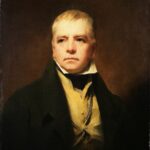The Philosophical Leaders of Scotland: Rational Inquiry and the Birth of Modern Thought
Scotland has long stood as one of the intellectual powerhouses of Western philosophy. From the medieval religious thinkers of the early Christian church to the empiricists and moral philosophers of the Scottish Enlightenment, Scotland’s intellectual leaders have shaped the course of human thought. Figures such as David Hume, Adam Smith, and Thomas Reid not only defined the philosophical framework of modern science, ethics, and economics, but they also placed Scotland at the very center of the Enlightenment—a period that fundamentally reshaped Western political, social, and intellectual life.
Scottish philosophy is marked by a profound commitment to rationalism and empiricism, the idea that knowledge must be grounded in observation, reason, and evidence rather than dogma and superstition. Historian Michael Lynch describes the rise of Scottish philosophy as “the triumph of reason over tradition, a flowering of intellectual independence that reflected Scotland’s broader political and social transformation in the 18th century” (Lynch, 1991). The legacy of Scotland’s philosophical leaders extends beyond academia—it shaped the moral, political, and economic structures of the modern world.
Scotland’s philosophical tradition was born out of political and religious conflict, forged in the crucible of the Reformation and the political upheavals of the 17th century. The intellectual revolution of the Scottish Enlightenment in the 18th century was not merely a philosophical event—it was part of a larger cultural and political awakening that reshaped the nature of Scottish identity and placed Scotland at the forefront of Western intellectual life.
The Early Philosophical Tradition (6th–16th Century): The Influence of Christianity and Scholasticism
The roots of Scottish philosophy lie in the early Christian tradition and the influence of medieval scholasticism. The introduction of Christianity to Scotland in the 6th century brought with it the philosophical doctrines of St. Augustine and the broader intellectual traditions of Roman Catholicism. Early Scottish monks and scholars preserved and adapted these traditions, establishing monastic centers of learning that would serve as the foundation for Scotland’s medieval universities.
John Duns Scotus (1266–1308): The Subtle Doctor
The first major Scottish philosophical figure was John Duns Scotus, a Franciscan theologian whose work in metaphysics and epistemology earned him the title “Doctor Subtilis” (the Subtle Doctor). Born in the Scottish Borders, Scotus studied in Oxford and Paris, where he developed a sophisticated theory of realism—the idea that universals (such as “redness” or “goodness”) have an independent existence apart from human perception.
Scotus’s most influential contribution was his argument for the univocity of being—the idea that the concept of “being” applies equally to God and to created things. This challenged the traditional Thomist view that God’s being was categorically different from human existence. Scotus also defended the doctrine of the Immaculate Conception centuries before it was accepted as official Catholic dogma.
Despite his intellectual achievements, Scotus’s work was marginalized by the rise of nominalism in the 14th century. However, his influence resurfaced during the Scottish Enlightenment, when empiricists such as David Hume would wrestle with the same metaphysical questions raised by Scotus.
George Buchanan (1506–1582): The Humanist Tradition
The Reformation in Scotland produced a new breed of philosophical thinker—scholars whose work combined classical humanism with religious reform. The most influential figure of this period was George Buchanan, a poet, historian, and political theorist who became one of the leading humanists of 16th-century Europe.
Buchanan was a fierce critic of Catholicism and an advocate of the Protestant Reformation. His work De Jure Regni apud Scotos (1579) argued that the king’s authority derived from the consent of the governed, not divine right—a revolutionary idea that anticipated the later theories of John Locke and Jean-Jacques Rousseau. Buchanan’s political philosophy laid the intellectual foundation for the Scottish Covenanting tradition and the later struggle for parliamentary sovereignty.
The Scottish Enlightenment (18th Century): The Age of Reason
The Scottish Enlightenment of the 18th century was one of the most extraordinary intellectual movements in Western history. In the span of a single century, Scotland produced some of the greatest thinkers in the history of philosophy, economics, and political theory. Historian Nicholas Phillipson described the Enlightenment as “a revolution in the mind—a movement that placed Scotland at the intellectual center of the modern world” (Phillipson, 2010).
The intellectual foundations of the Enlightenment were laid by the rise of empirical science, the growth of the Scottish universities (Edinburgh, Glasgow, Aberdeen, and St. Andrews), and the influence of earlier European philosophers such as Francis Bacon, John Locke, and Isaac Newton. Scottish thinkers rejected the metaphysical speculations of medieval philosophy in favor of a rigorous, evidence-based approach to knowledge.
David Hume (1711–1776): The Skeptical Philosopher
No figure better represents the intellectual revolution of the Scottish Enlightenment than David Hume. Born in Edinburgh in 1711, Hume was a philosophical skeptic who sought to apply the methods of empirical science to the study of human nature. His Treatise of Human Nature (1739–1740) argued that all human knowledge arises from sense experience rather than reason or divine revelation.
Hume’s radical empiricism led him to question the existence of causality and the notion of a coherent “self.” His argument that human beings cannot directly perceive causation—only a sequence of events—shook the foundations of metaphysics and epistemology. Hume also applied his skeptical methods to religion, arguing that miracles could never be proven because they violated the natural order of experience.
Hume’s philosophical skepticism earned him many critics, particularly among religious leaders, but his influence on Western thought was profound. Historian Richard Popkin notes that “Hume’s critique of causation and empirical knowledge laid the groundwork for modern epistemology and the philosophy of science” (Popkin, 1970).
Adam Smith (1723–1790): The Father of Modern Economics
Smith’s work in moral philosophy and political economy reshaped modern economic theory. His book The Wealth of Nations (1776) introduced the concept of the invisible hand—the idea that self-interest and free markets produce social benefits without the need for central control. Smith’s theory of moral sentiments argued that human morality is rooted not in religious doctrine but in the capacity for empathy and social cooperation.
Smith’s economic theories influenced political and economic thought worldwide, forming the intellectual foundation for modern capitalism. Historian Emma Rothschild argues that “Smith’s work in economics and moral philosophy remains the cornerstone of liberal political theory” (Rothschild, 2001).
Thomas Reid (1710–1796): The Founder of Scottish Common Sense Philosophy
Reid rejected Hume’s radical skepticism, arguing that human beings possess innate cognitive faculties that enable them to perceive the world directly. His theory of common sense realism argued that human knowledge is grounded in self-evident truths about the external world. Reid’s work laid the foundation for modern theories of perception and influenced both Kantian epistemology and American pragmatism.
Legacy and Conclusion
The Scottish philosophical tradition reshaped Western intellectual history. The empiricism of Hume influenced the development of modern science, the moral philosophy of Smith shaped modern economics, and the realism of Reid provided the basis for contemporary theories of mind and perception. Historian Michael Lynch writes, “The Scottish Enlightenment was not merely a philosophical movement—it was a revolution in how human beings understand themselves and the world around them” (Lynch, 1991).
The legacy of Scotland’s philosophical leaders endures in the universities, economic systems, and scientific paradigms that define modern society. The work of Hume, Smith, and Reid remains foundational to contemporary debates in philosophy, politics, and economics—a testament to Scotland’s enduring contribution to human thought.
References
- Lynch, Michael. (1991). Scotland: A New History. Pimlico.
- Phillipson, Nicholas. (2010). Adam Smith: An Enlightened Life. Yale University Press.
- Popkin, Richard. (1970). Hume’s Skepticism. University of California Press.
- Rothschild, Emma. (2001). Economic Sentiments: Adam Smith and His Time. Harvard University Press.
O





